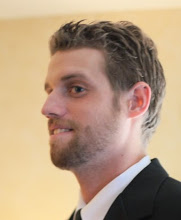.jpg)
The crowd gathers at the start of the race.
.jpg)
Abdulaye and Albert give instructions to the ladies' circuit.
It all started over a calabash of dolo. As the local beer gets passed back and forth, conversation tends to become exaggerated and past exploits more and more impressive. This time, I ended up in a heated argument with Albert, a farmer, gold miner, and herbalist, recognizable from afar by his three inch beard and trademark cowboy hat.
The point of contention was who was a better bike rider. In Albert’s favor, he had already soundly beaten me in other contests of strength and endurance, including weed pulling and hole digging. On top of that, he rode the Tour de Faso in his youth, which is not quite the Tour de France but still impressive in its own right, a yearly 800 mile race that draws competitors from across Africa and Europe. A formidable opponent, to be sure.
However, I argued that he is more than twice my age, and I’ve been in the habit of biking back and forth from village to Ouahigouya, the regional capital- a 50k round trip; not exactly Tour material but significant nonetheless.
Naturally, a race was proposed. It started as me against Albert, but we decided it might be fun with other villagers added to the lineup as well. At some point my inner Peace Corps training spoke up and suggested that we take advantage of the crowd and do an AIDS presentation. Things got more complicated from there.
We added malnutrition and general hygiene to the program, and proposed prizes for the bike race, and for those who answered questions correctly during the presentations. Respected guests were invited from neighboring villages and Ouahigouya, and an elaborate lunch envisioned. A dance party for the youth was planned for the evening.
Preparation intensified. Hours were spent on protocol visits to local officials to gain their blessings. A flowery worded request had to be presented to the mayor for permission to hold the dance.
I found a small grant to help with the costs, but the organizers’ dreams far exceeded the means. My colleagues were insistent on serving meat and bottled beverages to the invited guests. I heard various versions of the same speech at least ten different times: “Here in Africa, if you invite someone to an event you have to welcome them with meat and drinks.” A fine tradition of welcome, to be sure, but somebody has to pay for it, and I wasn’t going to spend development money on the invitees, who were all people who had money to buy a soda if they wanted one. Finally someone came through with a goat and my co-organizers found money for the beverages on their own.
Final preparations were made all day Saturday. Responsibilities were delegated to a variety of helpers. We followed the route of the race with a donkey cart, filling in holes with dirt. We planned a 6AM wake up Sunday to complete the last minute setup. Finally, late in the evening, everything was in place and I went home to sleep.
The night was hot, and I considered pitching my tent in the courtyard instead of trying to sleep in my concrete oven of a house. However, my father has always considered himself a kind of human low-pressure system, bringing rain wherever he passed, due to the fact that every family vacation was spent mired in dripping rain jackets, leaky tents and soggy sleeping bags. Some lightning in the distance heightened my suspicions that it might run in the family, so I didn’t bother with the tent and sweated it out inside instead.
At three in the morning I awoke to the sound of rain tapping on my tin roof. Naturally. When I woke again at six to help set up, it was pouring. I didn’t bother getting out of bed, knowing no one else would either. The storms typically last three to four hours, so I figured I’d wait it out and we’d decide whether to postpone the race after the rain finished. At nine, still pouring, I knew we’d have to reschedule. At noon, with still no signs of letting up, I began to worry about the neighbors. Finally, around three thirty in the afternoon, the rain slowed to a trickle and finally stopped. I ventured outside to see what was left of the village.
Mud brick construction has the advantages of being cheap, fast, and solid enough to last up to twenty years with only minor repairs, before it is necessary to start over. However, the bricks are not stable enough to withstand more than 12 hours of soaking rain, which I was repeatedly assured was the biggest storm in village history. Wading through rivers where no rivers had been before, I surveyed the town, and rare were the courtyards that didn’t have at least one house, granary, or wall that had succumbed to the storm and tumbled to the ground.
“It was a bombardment,” one friend told me. “Today, the B52s came to town and attacked us.”
Another said, “Aaron, it was good of you to bring rains to our village, but this was too much.” I shrugged, and blamed it on my Dad.
We rescheduled the race for a later date, giving everyone time to rebuild their houses first. On the appointed day, nothing went exactly as planned, but the race was held in front of a huge crowd, the guests got their meal, and the health presentations were a success. Everybody seemed happy with the result of all our work.
As for me and Albert? We didn’t actually participate in the race, occupying ourselves with the organization instead. Our personal contest has been put off into the indeterminate future. It’s okay though; this way we still have something to argue about over the next calabash of dolo.

No comments:
Post a Comment